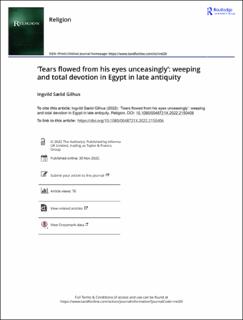‘Tears flowed from his eyes unceasingly’: weeping and total devotion in Egypt in late antiquity
Journal article, Peer reviewed
Published version

Åpne
Permanent lenke
https://hdl.handle.net/11250/3039355Utgivelsesdato
2022Metadata
Vis full innførselSamlinger
Sammendrag
The article discusses the practice of weeping in Pachomian monasticism as a performance of absolute devotion. Theories about radical religion and approaches to emotions are used as a theoretical lens. Pachomian sources show a religious society in the making. Its emotional practices, including weeping, reflect a form of total devotion toward the divine, the monastic father, and the religious group. The article looks into how weeping was performed, what its scales were, in which ways it reflected religious excellence, and what sort of emotional regime it supported. Weeping interacted with a hierarchical organization and an authoritarian leadership intent on control. Leadership issues were set in a context of intense weeping, founded on the submission of the monastic son to the monastic father and on the son's total devotion to the monastic father and the divine. In the monastic story world, weeping and tears are strong textual signals and a pull factor in radical religion.
